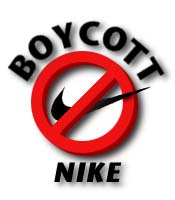BOYCOTTING WORKS:
CHECK THIS LATEST OPINION PIECE
Printed in the Sacramento Bee Wednesday, July 5, 2000
"Globalization and the cost of shoes
Nike's manufacturing jobs are highly desired."
Sneakers cost about $16.75 on the factory floor.
By Holger Jensen
JAKARTA, Indonesia - Most Indonesians have never heard of Tiger Woods or they might think it was unfair.
As Nike's top salesman, so to speak, Woods earns $20 million a year for promoting the company's products simply by playing golf:
The Indonesians who actually make those shoes and sports clothes earn an average of $786 a year.
An extreme example, perhaps, but that is what globalization is all about.
Nike is one of many American companies that have taken advantage of the world's economic inequities to make a profit.
Contrary to popular belief, Nike does not manufacture its own products. It is a marketing and design firm that buys its goods from independent contractors in underdeveloped nations, where wages are low, and resells them in richer nations where people can afford to pay $100 for a pair of sneakers.
You may be interested to know that those sneakers cost about $16.75 on the factory floor. Nike's greakdown is 65 percent for materia1s, 15 percent for labor, 15 perent factory overhead and 5 perent profit.
Americans don't want to make Nikes. If they did, U.S. wage scales would make the cost and markups prohibitive.
Worldwide, Nike has contracts with 700 factories that employ 550,000 workers in 50 countries. Indonesia, for example, has 11 footwear factories, 12 apparel factories and four equipment factories manufacturing Nike products that account for approximately $1 billion in exports a year.
These plants employ 110,000 Indonesians whose take-home pay averages $65 a month. This may not be much by our standards but is nearly double Indonesia's minimum wage of $34 a month and comes with other benefits that include overtime and holiday bonuses, social security, free health care, free schooling, free clothing, at least one free meal a day and sometimes free housing.
In a country where 36 million people are unemployed and 60 percent of the population lives below the poverty line, pegged at $1.50 a day; Nike jobs are highly desired.
About 85 percent ofNike's work force are women who labor for a
few years in the factories, then go home to get married, further their educations or move on to better things. Few have any regrets.
Kusniah, 21, and Dunnarli, 22, both work at Astra Graphia Tbk., a factory that makes Nike tennis shoes 25 miles outside Jakarta.
Their only other alternative would have been wading in rice paddies to help their families eke out an existence in agriculture.
Kusniah has only a junior high school education, Dunnarli finished high school. Both met their husbands at the Nike plant in Balarajah, and both consider themselves lucky to be employed at a time when Indonesia is experiencing massive politica1 and economic turmoil.
"We have good working conditions and they take care of our health," said Kusniah. "What more can you ask?" That said, Nike has come under heavy criticism for running "sweatshops" in Southeast Asia.
And company spokeswoman Tammy Rodriguez is the first to admit that public pressure forced the company to clean up its act.
Nike plants must abide by a of conduct that provides:
* A safe and healthy workplace free from harassment or abuse.
* Fair and full compensation including all benefits mandated by law.
* Freedom of association and collective bargaining.
* Payment and promotion based solely on ability to do the job.
* Safe limits on total hours and consecutive days
that people can be required to work.
Nike has contracted for independent auditing ofworkplace standards. All production lines in Indonesia have stopped using solvent-based adhesives and substituted water-based adhesives that produce no noxious odors. All limit their workers to 20 hours of overtime a week. And any worker who does not have a high school education can get one gratis.
The only sweatshops that exist in Indonesia today are those that make "unbranded" shoes, such as those sold in Target or Wa1Mart. Many are joint ventures between Indonesians and Koreans or Taiwanese, and industry sources say conditions in those factories remain "terrible." But don't blame Tiger Woods.
Holger Jensen writes for Denver Rocky Mountain News.

HOT LINKS


